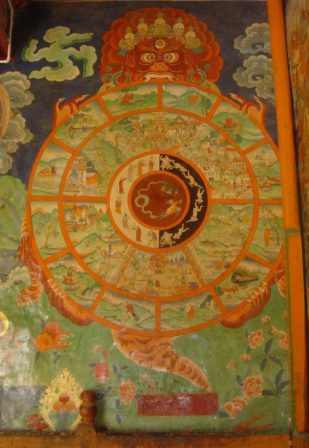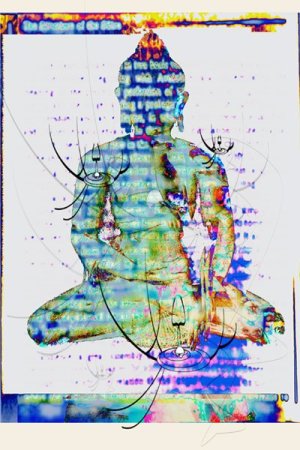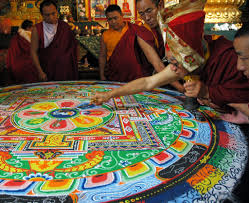 Rita M Gross is her “Buddhism after Patriarchy” says that Buddhism is Feminism. I think I understand what she means.
Rita M Gross is her “Buddhism after Patriarchy” says that Buddhism is Feminism. I think I understand what she means.
The goal of Buddhist practice, Enlightenment, is often called Liberation. Liberation can be seen as the goal of Feminism too. In different schools of Buddhism is interpreted differently, but one of the classic explanation is that it is freedom from or absence of anger, lust and ignorance. Enlightenment is also described as a state of ego-lessness.
Rita M. Gross justifiably clarifies the Buddhist understanding of “ego” and “ego-lessness”, which is different from conventional Western notion of ego as “strength” or “scale” of personality. Rita M Gross points out that sometimes feminists say that women need larger egos, not smaller or no egos.

Buddhism sees any ego, any identity, big or small, macho or oppressed, as a hindrance to Enlightenment, Rita M. Gross argues.
As a political scientist, I can describe ego, or as I prefer to call it, identity, in terms of socialisation. Socialisation is the process we go through in order to become part of society as opposed to a lump of biological mass that our parents deliver into the world. Socialisation can be visualised as society flowing in and filling in that biological mass. Little by little, a human being becomes one particular expression of the society she lives in.
According to the specific circumstances of socialisation that expression can be conventional – i.e., an individual will be like most members of her society. It can be marginal: a person will be a homeless person, or an aggressive right-winger. It can also be extremely progressive – and the person then becomes a leader of a reformist movement.
We cannot live without identity – or a number or identities for various circumstances. At the same time, I believe that it is the goal of Buddhist practice to become free of your identity, independent from it.
Even within Buddhism this leaving identity behind has always been challenging. Mahayana, a younger branch of Buddhism compared to Theravada (the only surviving out of original Indian Buddhist schools), deals with this issue by creating a new, “correct” and “Buddhist” identity: that of Bodhisattva, i.e. an individual devoted to liberating every other being before reaching Liberation.
Identity is what stands on the way of feminist ideals too. The reason why it is difficult to control or get rid of harmful identities is because identity is not rational or intellectual. You cannot think it away. Identity is build into your body, into your biology.
I remember the first time when I clearly realised this. I was working in an American summer camp. During a traditional pyjamas breakfast campers started throwing bread rolls at each other, and the adults joined. I almost threw up. In Slavic cultures, bread is sacred. You never throw away bread crusts; you never put bread in the bread bin upside down. Throwing bread for fun is unthinkable. This is just a concept, an idea, a tradition. However, it has spread roots all around my organism and as I saw it violated I had a physical reaction.

This is what Buddhist practice is for: it gently peels off layer after layer of acquired constituent parts of your identity.
Most often it is male identities that are harmful to feminism. Somebody who has not experienced Feminist teachings, Buddhist practice, psychological therapy or any type of self-reflectiion practice, would find it difficult to discern within himself those traits which are beneficial and those which are harmful to him, women and society. See an issue of New Internationalist The Changing Face of Masculinity (July 2011) that reports initiatives across the world where men in groups discover building blocks of their male identities, which cause them harm, and together learn to abandon their macho identities. Most of these harmful traits a man would have picked up uncritically, through socialisation. These traits are all “him”, “himself”, his “identity” to him.
Sometimes it is parts of female identities or whole identities of women, created by capitalist patriarchal societies, which stand on the way of Feminism. At the moment an identity of a female consumerist is popular, especially in the countries that have relatively recently emerged from materialist scarcity and embraced capitalism. In a Ukrainian reality TV programme in which a country girl switches life with a city decadent girl for a few days, I heard the city girl say: “A woman must not work”. It was said as a credo.

Buddhist practice focuses on direct interaction with the world, not clouded by identities. Direct contact with the world can be painful, and one of the purposes and roles of identity is to cushion a person’s contact with herself, with other people and with the realities of physical world, such as impermanence. This is one of the functions of mindfulness: it allows for immediate experience, including that of pain, before pain is suppressed and turned into a harmful aspect of your ego. The idea is that moment by moment it is possible to deal with almost anything, whereas each painful experience, which is avoided, suppressed or ignored, caused more problems in the future.
Women can pick up anti-feminist identities in order to escape the pain of patriarchal goal. These identities include: a saint who has transcended needs for personal assertiveness, humble servant to everyone, who finds fulfilment in self-degradation. There is also “container” and “enabler” of male initiatives as opposed to “doer”. In some Buddhist schools, a woman is likened to the enlightened “space” (supposedly as a complement). This sounds too much like an “enabler” identity to me.
As a realist, I do not object to gradual replacing harmful anti-feminist identities with feminist ones – both for men and women. However, as a Buddhist practitioner and as a political scientist I argue that any identity, even a feminist one, is inevitable limited and conditioned by the society where it exists. Only complete leaving behind any identity can bring about true Liberation.
Oxana Poberejnaia was an Officer of the University of Manchester Buddhist Society while studying for a PhD in Government, and has been involved in organising the Manchester Buddhist Convention, now in its 9th year. Oxana is now exploring the Sacred Feminine through marking seasonal festivals, working with her menstrual cycle, frame drumming and shamanic journeying, while keeping the practice of Buddhist meditation. Oxana is an artist and an author. She teaches frame drumming and meditation. Her works can be found on her blog.
http://poeticoxana.wordpress.com


Love your Buddhist feminism!! Oxana!!
LikeLike
Hello, Sarah! Thank you for your kind words!
LikeLike
I recently read the story of the Buddhist Goddess Tara. Briefly, she was known far and wide as a deeply spiritual person, so much so that the monks suggested that she pray to be re-born as a man so she could reach her full potential. Her response was that Buddhism does not recognize “male” and “female”; therefore it didn’t matter what form she appeared in, for both were equally spiritual. I like that Lady!
LikeLike
Hello, MaryAnn! Yup, That’s right, Rita M Gross also points out that it is precisely in Vajrayana Buddhism (Where tara comes from) that this teaching is particularly pronounced. Also, there is a contemporary Tibetan Buddhist woman practitioner, Tenzin Palmo, whose life has been described in a book Cave in the Snow, http://www.amazon.co.uk/Cave-Snow-Western-Womans-Enlightenment/dp/0747543895 who talked to the Dalai Lama about women’s position in Tibetan Buddhism, founded a nunnery in Tibet to help Tibetan Buddhist women to become independent, and made an oath to get enlightened while in female form.
LikeLike
Oxana —
I think this is a wonderful post that demonstrates how Buddhist practice can help feminists in experiencing our lives with less baggage (or none if you reach “enlightenment”). It reminds me of a time when I was in my early 40s and realized that in order to become more spiritual, I needed to let go of my feminist identity. This realization caused a crisis for me until I realized that it was just my feminist IDENTITY I needed to get rid of, not the feminist tools that I had accrued over the years. In other words, I had to stop identifying with those critical, feminist tools, but they were still available to me when I needed to understand or act on patriarchal injustice in my life.
LikeLike
Hello, Nancy! Thank you for reading and your supportive words. Yes, absolutely. Recently I heard similar words from my friend, a homeopath and a shamanic practitioner, who said that she barely uses the tools she had to learn at the beginning of her path.
LikeLike
Reblogged this on lindulivan and commented:
mmmm…..Feminism!
LikeLike
Hello, Lindu! Thank you so much for reading and for reblogging! I really appreciate this!
LikeLike
Hi Oxana, yes and i really interested to know more about Feminism!
LikeLike
I wonder if there is a difference between clinging to an identity and affirming one’s own history and body in a spirit that also affirms diversity and difference. I do not want to “let go” of everything that defines me as an embodied person embedded in history and nature. Part of this is being a woman, being white, being tall, coming from an immigrant history that was denied, being born American, becoming an American-Greek hybrid, and so forth. I don’t think having an identity is the problem, but I do agree that clinging to an identity can be, and not affirming diversity and difference in the web of life certainly is a problem. But then, I am not a Buddhist, perhaps in part because I do not want to be liberated from life in my body, history, and the parts of nature I know. Or maybe I don’t understand what you are saying or the Buddhist ideal as you are expressing it.
LikeLike
Carol, in Zen, what you describe is the absolute archway to enlightenment, that is, perfect ptesence to the present moment.
LikeLike
Yup
LikeLike
Hello, Carol! Thank you for reading and commenting! Yes, absolutely. Affirming is part of liberation, of course – like any speaking the truth and self-investigation. I will give you an example from a completely different field. In Russia and some other Slavic nations at the moment a pseudo history of Russians as Aryans, the most ancient people in the world with a vast empire in pre-history, is very popular. One of the postulates of this movement/faith is that Russians are natural-born soldiers and that Russian soldiers never fought in unjust wars. The simple listing of unjust wars that Russia has been involved in (Finland just before WWII, Afghanistan, Caucasus and Ukraine currently) dispels this myth. so, yes, any truth is powerful and should be told.
One cannot live in society without identity. It is also said that enlightened Buddhist masters do not abandon their character, their character in fact becomes more pronounced. They just don’t cling to it, or, if you will, do not treat their identity so seriously, the same as they treat anything else in the world.
To tell you the truth, there is not such a thing as a “Buddhist”, or “being a Buddhist”. We just don’t mind playing the game of ticking the box on census form, since everyone else is doing it, and it does not make a difference to us either way. There is a Russian saying about this: “You can call me a pot if you like, just don’t put me in the oven”.
Buddhists are not forced to let go of anything , their identities or anything else. People take up this or that Buddhist practice, or bits of those, and practice them for as long as they like and I suppose find these useful or meaningful or anything else to them.
And the Buddhist ideal is – I suppose no one could express it better than the historical Buddha: “”I teach only suffering and the end of suffering.” (Majjhima Nikaya 22)
As I mentioned before, if you are not suffering and/or don’t want the end of suffering, you don’t have to worry about the Buddhist teaching.
LikeLike
No I am not suffering, in part because I have given up certain goals that i once thought I had to have or I would rather die.
I am not in favor of any nation state, national identity, or identity as a warrior, I agree with you 100% there.
I embrace both American and Greek identities lightlly, not including nationalism, and in awareness that neither country has ever fully accepted the other, including women.
LikeLike
To clarify what I was trying to say in my response (above), what I realized in my early forties was that I needed to stop some of my knee-jerk reactions that came from being a feminist, in other words, to be present more to what was actually happening in the moment and not automatically act out of my feminist identity, because this part of my identity could be just as limiting as any other part of my personality that I identified with (i.e. clung to). I can’t and don’t let go of what defines me, but instead remember that it is a filter for how I experience the world, one that can help me at times, but one that can also taint interactions and experiences. As a witch, I have no desire to liberated from my body or from nature. To me that would be denying a large part of my actual in-the-moment experience. I really like the way you express it, Oxana, “One cannot live in society without identity. It is also said that enlightened Buddhist masters do not abandon their character, their character in fact becomes more pronounced. They just don’t cling to it, or, if you will, do not treat their identity so seriously, the same as they treat anything else in the world.” Again, great post!
LikeLike
Nancy, thank you so much for your very kind words. As a writer, I am supported and uplifted by kind comments on my writing. Thank you also for your very thoughtful approach to Feminism and Buddhism. I really like your thoughts about what is actually happening in the moment. Great.
LikeLike